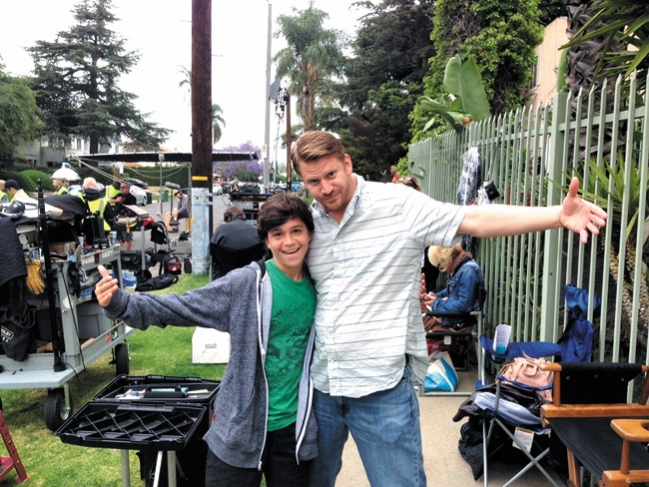From Hawaii To Ray Donovan (With Love)
Everyone is telling him, ‘You have to hate these people, they’re bad.’ But racism just flies past his head.”
Hawaii actor Kalama Epstein, 13 – who jokes about being a “Jewaiian” mix – is on the set of Under the Blood-Red Sun, to be released this summer. He’s describing his character, Billy, a caucasian, and Billy’s unbreakable friendship with a Japanese boy Tomi (Kyler Sakamoto) during turbulent WW II race relations on Oahu. The poignant theme helped make the 1995 book by local writer Graham Salisbury popular grade school reading. The book also caught producer Dana Satler Hankins’ eye, and he snapped up film rights soon after it was published. Funds finally raised, the project is on.
mw-art-120413-dec7
After a range of gigs in LA, including a speaking role on new, hit TV series Ray Donovan (for fans, he’s the kid riding Bunchy’s bike), Manoa-raised Epstein is thrilled to be filming back at home. Many kids dream of being an actor, but from the earliest age Epstein, the great grandson of Hawaii carnival founder E.K Fernandez, knew he wanted to be a director.
“Kalama was maybe 8 or 9 and he said, Mom, I’ve got to learn how to act,” says Kendra. “How am I going to be a director if I don’t know about acting?”
He’d already been in several cute-kid commercials. A role in his school musical at Mid Pac, some acting lessons at Scott Rogers Studios and a Five-0 spot later, and he was itching for the bright lights.
“I said, Mom, I can do this. Please take me to L.A.”
He begged for months. With two older sisters in college and Queen’s Medical Center OK with giving mom time away from her social work job, Kendra took the 11-year-old to the Golden State. He instantly found a manager who sent him to an agent, who was ready to sign Epstein right away.
“I don’t know, I’ve got to think about it,” was the precocious boy’s response. The manager clued the boy in and within days Epstein was auditioning for big roles. With homeschooling, a friend offering living space in L.A. and gifts of frequent-flier miles from friends, mom and son have been bouncing between home and Hollywood. And he’s moving full steam ahead:
“What I’ve learned is you are not going to make it in this industry if you do not work. You need to put everything you’ve got into it and you need to work, work, work – memorizing scripts, going to acting classes and a bucketful of auditions.”
His most recent L.A. gig is as the lead in Maker Shack Agency, a kid’s series to be featured on Amazon Prime early next year about a young inventor who with his friends creates things to help make people’s lives better. To finally be cast for a single role encompasses a slew of auditions, producer and director sessions and “chemistry readings” with other characters. Sometimes, says Kalama, he’ll make it to the top two, and be dropped. But he takes it like an old soul … or should we say, a young man with experience and ambition:
“It’s not like they love me every time. To be in the industry, you have to have confidence. You can’t hate yourself if you don’t get a call back, where oh, no, I’m so bad, and then you think about that for the rest of the month and you ruin all your other gigs. Sometimes I’m just not right for the role.”
His eventual goal is film school, and then to make his director dream a reality. Perhaps an LA move is in the offing?
“Hawaii is the only place for me,” he replies confidently.
ALSO SHOWING
Dec. 7 Through the Eyes of Keiki
Nothing is the Same (Dec. 7 and 14, htyweb.org) at Honolulu Theatre for Youth parallels a message from Under the Blood-Red Sun. Four 11-year-olds who spend their days playing marbles suddenly find their friendship tainted by the Dec. 7 Japanese bombing of Pearl Harbor. A Japanese boy is soon shunned by his Filipino best friend. Confused, the latter decides that if the government has taken the Japanese boy’s family away, then they must have done something wrong. The show takes on big concepts, with global issues reflected in the children’s own social navigation. For instance, random waverings of friendship and enmity – how does it make sense that the U.S. is now allies with the British, the very people they once fiercely fought? There’s also a bully who gets an ego-thrashing. Nothing doesn’t just bring history to life, it brings alive issues relevant today. The Japanese boy dreams he’s the bomber pilot. After all, a man who shares his blood was flying over him, trying to kill him. Though less structured and more theory-focused than usual HTY fare, the keiki audience didn’t seem to mind.






